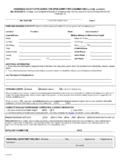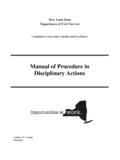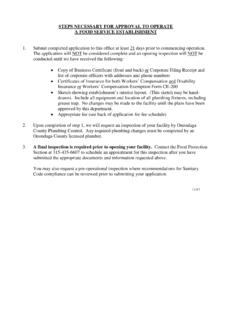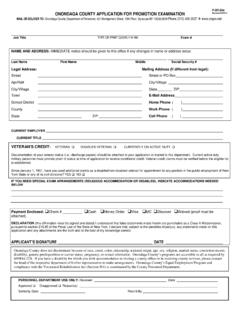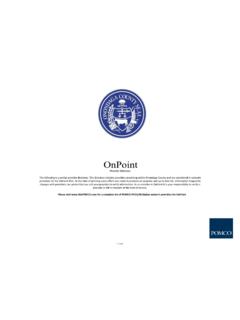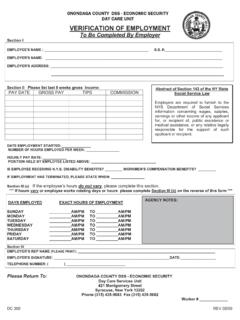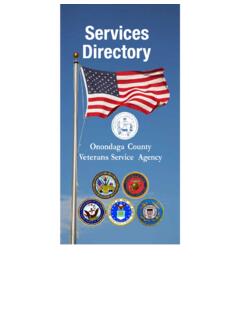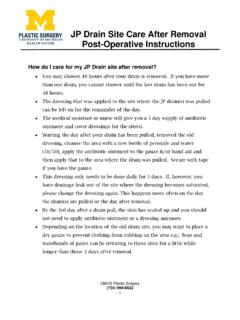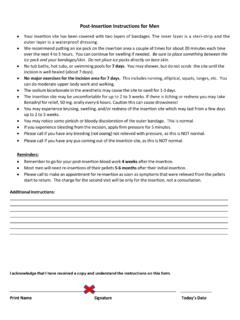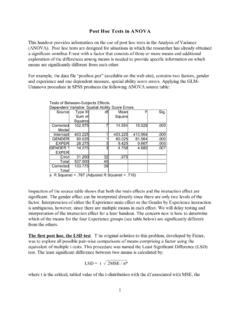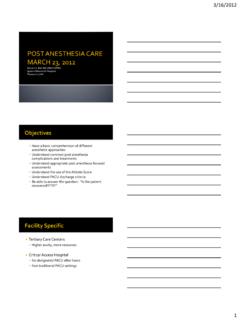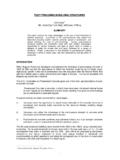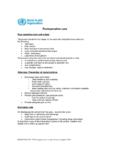Transcription of Top 15 Questions About the Post 9-11 GI Bill 092010
1 Top 15 Questions About the post -9/11 GI Bill Who is Eligible for the post -9/11 GI Bill? Veterans who have served on active duty at least 90 aggregate days after Sept. 10, 2001, or served at least 30 continuous days on active duty after Sept. 10, 2001 and received a discharge for disability. Officers who graduated from service academies or received ROTC scholarships qualify for the post -9/11 GI Bill benefit. However, time spent satisfying the ROTC/service academy active duty obligation does not count toward the active duty service necessary to qualify for the benefits. Am I Eligible for the post -9/11 GI Bill If I Used All of My Benefits Under the Montgomery GI Bill? If you used all 36 months of benefits under MGIB and you are eligible for the post -9/11 GI Bill, you may receive up to 12 months of benefits under the post -9/11 GI Bill. However, you cannot receive more than a maximum of 48 months of benefits under any combination of Department of Veterans Affairs education programs.
2 Can I Use the post -9/11 GI Bill While on Active Duty? Yes, but you cannot receive a housing allowance, or stipends for books and supplies. You must have completed a minimum of 90 days of service (other than basic training), and the tuition payment cannot exceed the amount not paid by military tuition assistance and/or the total amount of tuition and fees. Do I Get My $1,200 Refunded if I Switch From the Montgomery GI Bill to the post -9/11 GI Bill? Any individual who paid the $1,200 buy-in for the Montgomery GI Bill and chooses to use the post -9/11 GI Bill may be refunded a proportional amount if all entitlement under the post -9/11 GI Bill is used. Individuals who do not use all their entitlement under the post -9/11 GI Bill will not receive a refund. Does the post -9/11 GI Bill pay for vocational training programs?
3 Programs offered by institutions of higher learning (degree-granting institutions) are approved under the post -9/11 GI Bill. Only those individuals who transfer to the new benefit program from the MGIB, MGIB-SR, or REAP are eligible for benefits for on-the-job training, apprenticeship training, correspondence courses, flight training, or courses offered by institutions other than institutions of higher learning. Such individuals will be paid amounts similar to what they would have been paid under the benefit program from which they transferred. (No housing allowance and no book stipend.) How Are Benefits Paid? There are three different payments under the post -9/11 GI Bill: 1. Tuition and fees, paid directly to the school, not to exceed the maximum in-state undergraduate tuition and fees at a public institution. 2.
4 Monthly housing allowance, paid to the individual 3. Books and supplies stipend, paid to the individual How Do I Apply? Electronic application forms can be completed and submitted online at If you can t apply online, you can call 1-888-GI BILL-1 (1-888-442-4551) to have a form mailed to you. You can also get an application form at the school you wish to attend. The VA certifying official at the school (usually in the registrar's or financial aid office) should have the forms. They can help you fill them out and will submit them to Department of Veterans Affairs. How Long Do I Have to Use the post -9/11 GI Bill Benefits? The post -9/11 GI Bill benefits are payable for 15 years following the individual s release from active duty. Is the post -9/11 GI Bill My Only Choice? No. Many veterans and active duty personnel can qualify for more than one education benefits program, including the Montgomery GI Bill, Reserve Educational Assistance Program (REAP) and the post Vietnam Era Veterans' Educational Assistance program (VEAP).
5 Which one of these programs will best meet your needs depends on your individual circumstances. To compare the benefits offered by the post -9/11 GI Bill and the Montgomery GI Bill, click here (link to double truck MONTGOMERY GI BILL VS. post -9/11 GI BILL section of the MFS anchor article Your Free College Degree). The Department of Veterans Affairs also offers a step-by-step process at that can help you compare the different education programs and decide which one is best for you. What Benefits Does the post -911 GI Bill Pay? Tuition and Fees: Veterans may be eligible for full payment of their tuition and fees, not to exceed the maximum in-state undergraduate tuition and fees at a public Institution in the state in which the student is enrolled. Housing Allowance: The housing allowance is equivalent to Basic Allowance for Housing (BAH) for an E-5 with dependents, based on the ZIP code of the school where the student is enrolled.
6 However, active duty service members, anyone enrolled half time or less and those pursuing entirely distance learning are not eligible for the monthly housing allowance. Books and Stipends: A books and supplies stipend of up to $1,000 per year can be paid, which is prorated based upon the student s payment rate. Active duty members are not eligible for this payment. Tutoring: Benefits for tutorial assistance or up to $2,000 for the reimbursement of one licensing or certification test is available. Training programs: Those who transfer to the post -9/11 GI Bill from the Montgomery GI Bill Active Duty, Montgomery GI Bill Selected Reserves or the Reserve Educational Assistance Program may receive post -9/11 GI Bill benefits for flight training, apprenticeships, on-the-job training programs and correspondence courses.
7 Moving costs: A one-time rural benefit payment of $500 to individuals who reside in a county with six persons or fewer per square mile (as determined by the most recent decennial census), and who either: physically relocate at least 500 miles to attend an educational institution or relocate by air to attend an educational institution (if no other land-based transportation exists.) What If My State Already Offers Free Tuition? The Department of Veterans Affairs will not pay for tuition that isn't charged. However, you are still eligible for the books stipend and monthly housing allowance. What is the Yellow Ribbon Program? Veterans who qualify for the post -9/11 GI Bill at the maximum benefit rate are eligible for the Yellow Ribbon Program, as are military dependents who receive their education benefits through the new GI Bill s transferability provision.
8 The Yellow Ribbon Program allows private colleges to enter into a cost-sharing agreement with the Department of Veterans Affairs (VA) to offset tuition expenses that exceed the standard VA reimbursement level in their state. The VA will match up to 50 percent of the unmet charges, with the school contributing an equal amount. Public institutions also can sign Yellow Ribbon agreements to offset higher tuition costs for out-of-state students. Colleges must determine the maximum number of students who will receive funds under the program, and eligible students must be selected on a first-come, first-served basis. Once selected for the Yellow Ribbon Program, a student continues to receive funding as long as they maintain satisfactory academic progress and have GI Bill entitlement. Who Receives the Tuition Payments, Me or My School?
9 The Department of Veterans Affairs will make the payments directly to the school on behalf of each student. Can I Transfer My post -9/11 GI Bill Benefits to My Family? A special provision of the program allows career service members the opportunity to share their education benefits with immediate family members. The Department of Defense has established the policies and procedures for this program. Application Procedures All applications should be submitted through the Transferability of Educational Benefits (TEB) Web site at . Service members will be able to securely access this site with a Common Access Card, a DoD Self Service User ID, or a DFAS PIN. Currently this application may be accessed only with Internet Explorer. Eligible Individuals Any member of the Armed Forces (active duty or selected reserve, officer or enlisted) who is eligible for the post -9/11 GI Bill, and Has at least six years of service in the Armed Forces on the date of election and agrees to serve four additional years in the Armed Forces from the date of election.
10 Has at least 10 years of service in the Armed Forces (active duty and/or selected reserve) on the date of election, is precluded by either standard policy (service or DoD) or statute from committing to four additional years, and agrees to serve for the maximum amount of time allowed by such policy or statute, or Is or becomes retirement eligible during the period from Aug. 1, 2009, through Aug. 1, 2013. A service member is considered to be retirement eligible if he or she has completed 20 years of active duty or 20 qualifying years of reserve service. For those individuals eligible for retirement on Aug. 1, 2009, no additional service is required. For those individuals who have an approved retirement date after Aug. 1, 2009, and before July 1, 2010, no additional service is required. For those individuals eligible for retirement after Aug.


